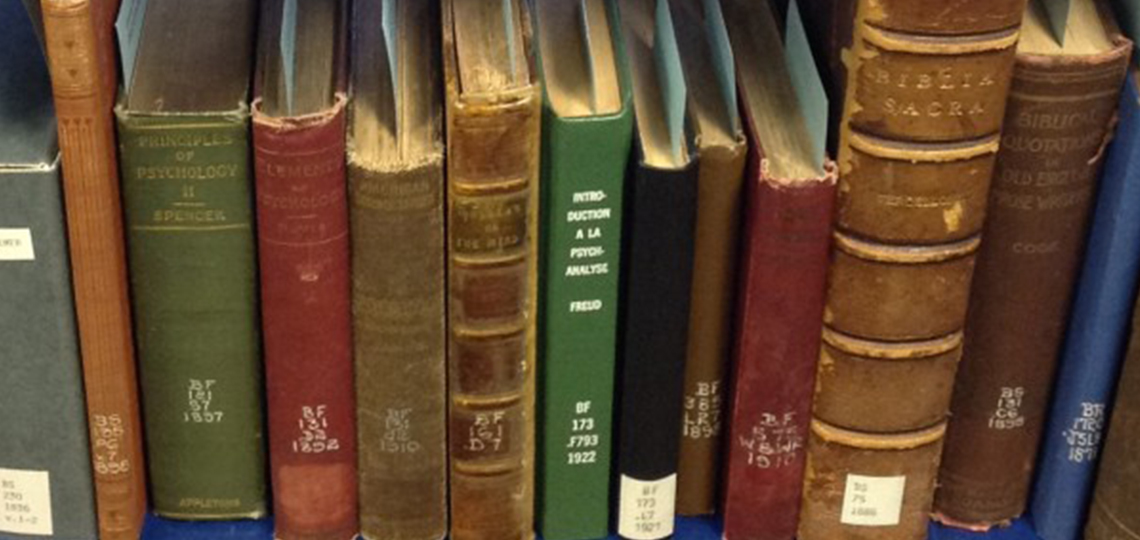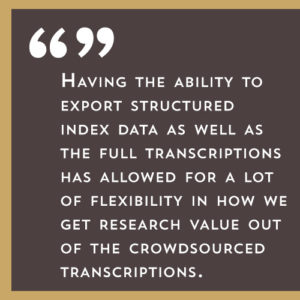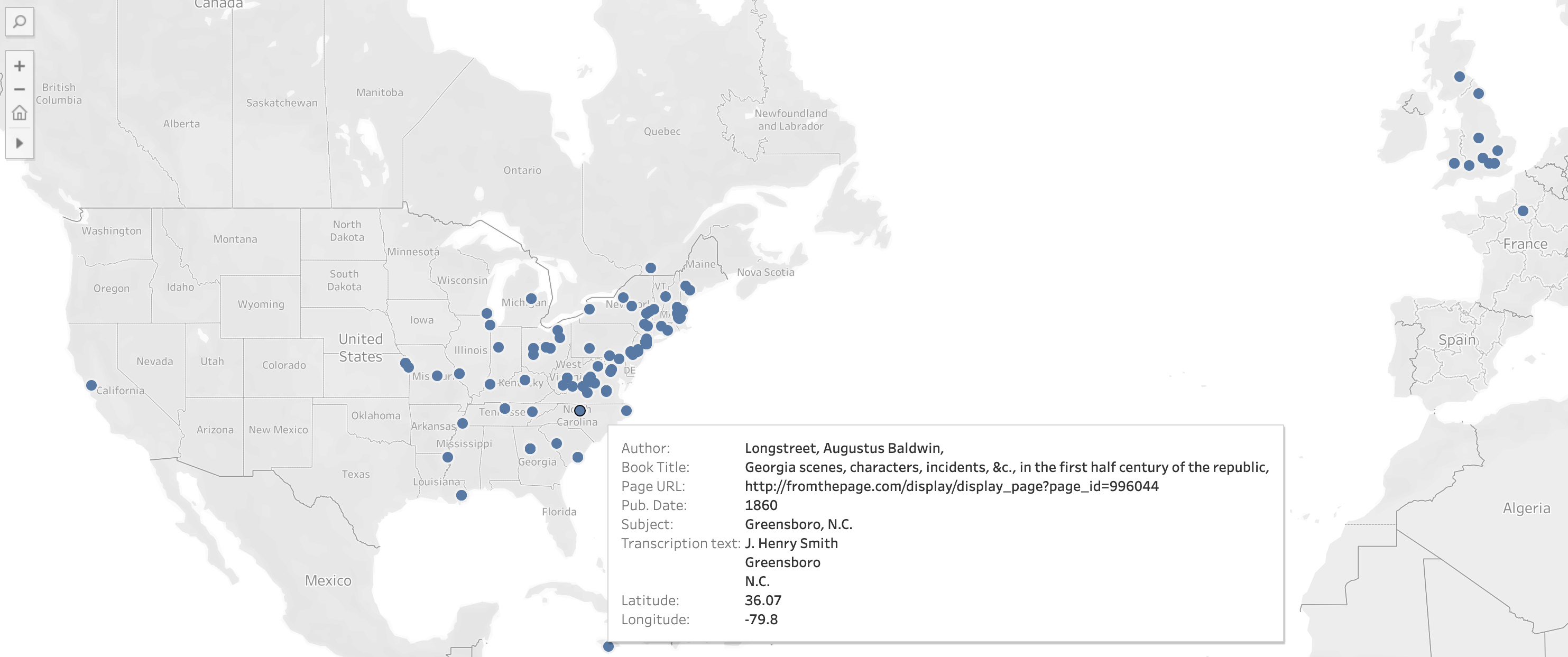
Kristin Jensen of the Book Traces project at the University of Virginia kindly took the time to answer questions from Sara Brumfield of FromThePage, and discussed their project and experience using the platform.
Book Traces is a collaborative web project aimed at discovering, cataloging, and preserving unique copies of 19th and early 2oth century books on library shelves.
Jensen is a Project Manager with the University of Virginia Library where the Book Traces project is headquartered.
First, tell us about your documents.
Book Traces is an ongoing project dedicated to finding traces of historical readers in old library books, specifically the books in circulating collections at college and university libraries.
We look for marginalia, gift inscriptions, doodles, correspondence, pressed flowers, and other evidence of the books’ readership in the “long nineteenth century,” up to the early 1920s. Mostly, what we are looking for is books that were privately owned and had a life outside the library before they were donated to the library collection.
The Book Traces project is based at the University of Virginia, but we have visited many other campuses across the country to talk about the  project and survey books on the shelves. Anybody interested in learning more about the project, or submitting photos of books at your campus library, can visit booktraces.org.
project and survey books on the shelves. Anybody interested in learning more about the project, or submitting photos of books at your campus library, can visit booktraces.org.
Currently, we are using FromThePage to get help transcribing written marginalia found in books at a dozen or so academic libraries around the state of Virginia. These books were photographed by UVA student research assistants as part of a project called “Civil War Era Readers and their Books in Virginia Libraries.” The books are all works of literature, history, religion, or military science, published no later than 1870, so they could have been read and marked up around the time of the American Civil War or its immediate aftermath.
What are your goals for the project?
We are especially interested in finding contemporary references to the Civil War, slavery, and American politics, but we are also gathering a lot of general data about the markings made by nineteenth-century American readers.
Amassing a set of data about this sample of books from several libraries in one region gives us new ways of studying the books as artifacts of history.
For example, Book Traces intern Julien Berman has used place name indexing data exported from FromThePage to create a map of places mentioned in readers’ inscriptions.
For another example, Book Traces research assistant Julie Wilson has aggregated the dates of readers’ inscriptions; by comparing these dates with the books’ dates of publication, we can tell that most of the books in this set were inscribed when they were brand new. In the future, we may be able to use FromThePage transcriptions to train a machine learning model to read handwritten marginalia in other books.

How are you recruiting or finding volunteers/collaborators?
The University of Virginia, like so many other campuses, shut down most of its on-site operations in mid-March of 2020 in response to the coronavirus pandemic. That left some UVA Library employees, including student workers, unable to work their normal hours because the on-campus libraries were closed and their jobs were not possible in a work-from-home setting. I decided to put Book Traces page images up on FromThePage so that UVA Library employees could fill part of their work time by contributing to the project remotely.
Although I uploaded Book Traces images to FromThePage with this pool of UVA Library workers in mind, I have been delighted to see a broad array of volunteers contribute transcriptions.
I cannot tell where everyone is coming from, but clearly there are many volunteers from well beyond UVA, and their assistance is much appreciated. I have tweeted a link to our FromThePage transcription project from the Book Traces Twitter account, but I am not sure if volunteers found us via that link or simply by browsing FromThePage.
Can you share your experience using FromThePage?
It has been very positive!
Having the ability to export structured index data as well as the full transcriptions has allowed for a lot of flexibility in how we get research value out of the crowdsourced transcriptions.
How does FromThePage & crowdsourcing fit with your project goals? How does it fit into your organization?
The Book Traces project is in part a reaction to the mass digitization of college library holdings: we normally emphasize walking into the stacks and considering each book as a physical artifact.
But when the COVID-19 crisis led to the widespread shutdown of on-campus activities and the closure of academic library stacks, we had to think differently about how to keep our research going.
We had a set of page images that had been collected from Virginia libraries during our “Civil War Era Readers” library surveys, but that had not been fully transcribed. It occurred to me that this would be an opportunity to crowdsource transcriptions for a well-defined data set.
When I first started uploading the images to FromThePage, I did not know exactly what we would do with the transcriptions, but as I mentioned above, now that we have started amassing transcriptions and index data, we keep finding new ways of looking at the collection.
Overall, I think the FromThePage transcriptions will be a valuable enhancement to our larger goals of understanding how nineteenth-century readers interacted with their books and how American academic library collections were developed through book donations.
What would you tell folks considering a similar project?
Depending on the scale of your project and the number of volunteers you attract, you may need help managing it. I have at times found it challenging to keep up with checking and correcting the volunteer transcriptions on top of all my other work.
This fall, Book Traces research assistant Julie Wilson has taken over the checking and correction tasks, referring only the toughest transcription puzzles to me and the project director, Andrew Stauffer. Her assistance has been key.
Anything else you'd like to tell us?
Thank you for creating FromThePage!
